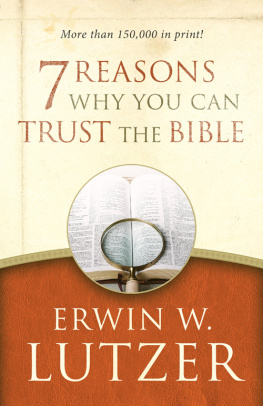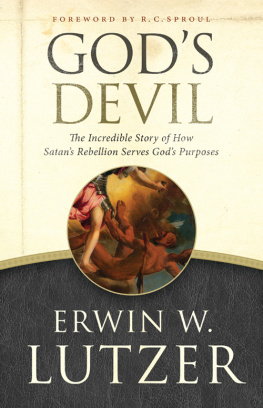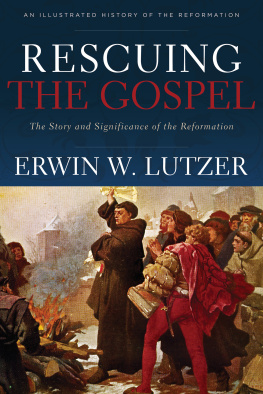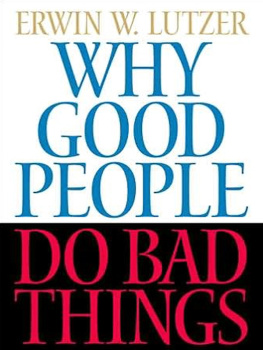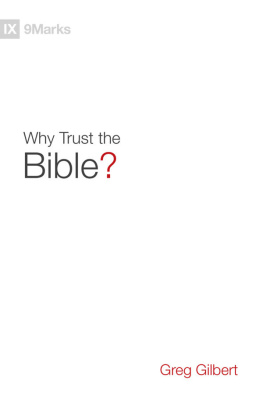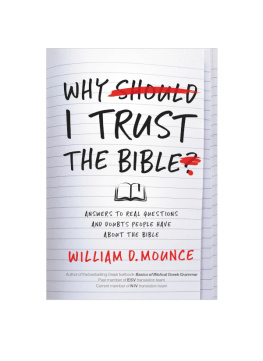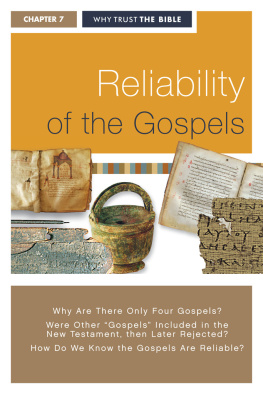Table of Contents
Pagebreaks of the print version
Guide


1998, 2008, 2015
ERWIN W. LUTZER
All rights reserved. No part of this book may be reproduced in any form without permission in writing from the publisher, except in the case of brief quotations embodied in critical articles or reviews.
All Scripture quotations, unless otherwise indicated, are taken from the New American Standard Bible, Copyright 1960, 1962, 1963, 1968, 1971, 1972, 1973, 1975, 1977, 1995 by The Lockman Foundation. Used by permission. (www.Lockman.org)
Scripture quotations marked RSV are from the Revised Standard Version of the Bible, copyright 1952 [2nd edition, 1971] by the Division of Christian Education of the National Council of the Churches of Christ in the USA. Used by permission. All rights reserved.
Scripture quotations marked NIV are taken from the Holy Bible, New International Version, NIV. Copyright 1973, 1978, 1984, 2011 by Biblica, Inc. Used by permission of Zondervan. All rights reserved worldwide. www.zondervan.com. The NIV and New International Version are trademarks registered in the United States Patent and Trademark Office by Biblica, Inc.
Scripture quotations marked ESV are taken from The Holy Bible, English Standard Version. Copyright 2000; 2001 by Crossway Bibles, a division of Good News Publishers. Used by permission. All rights reserved.
Scripture quotations marked NKJV are taken from the New King James Version. Copyright 1982 by Thomas Nelson, Inc. Used by permission. All rights reserved.
Scripture quotations marked KJV are taken from the King James Version.
Cover design: Smartt Guys design and Erik M. Peterson
Interior design: Erik M. Peterson and Smartt Guys design
Cover photo: of magnifying glass on Bible copyright by Pearl/Lightstock/60994. All rights reserved.
Library of Congress Cataloging-in-Publication Data
Lutzer, Erwin W.
Seven reasons why you can trust the Bible / Erwin W. Lutzer.
p. cm.
Includes bibliographical references.
ISBN 978-0-8024-1331-4
1. BibleEvidences, authority, etc. I. Title.
BS480.L78 2008
220.1dc22
2008024667
We hope you enjoy this book from Moody Publishers. Our goal is to provide high-quality, thought-provoking books and products that connect truth to your real needs and challenges. For more information on other books and products written and produced from a biblical perspective, go to www.moodypublishers.com or write to:
Moody Publishers
820 N. LaSalle Boulevard
Chicago, IL 60610
1 3 5 7 9 10 8 6 4 2
Printed in the United States of America
To Lynn and Shay Roush
May your trust in Gods Word guide your lives in making disciples for Christ
I shall delight in Your statutes; I shall not forget Your word.
Psalm 119:16
CONTENTS
INTRODUCTION
Waiting to Hear God Speak
ONE: A LOGICAL REASON
The Bible Claims to Be Gods Word
TWO: A HISTORICAL REASON
History Confirms the Bibles Reliability
THREE: A PROPHETIC REASON
Bible Prophecies Prove Its Truthfulness
FOUR: A CHRISTOLOGICAL REASON
Christ Affirmed the Bibles Authority and Truth
FIVE: A SCIENTIFIC REASON
Science Supports Biblical Creation
SIX: A PROVIDENTIAL REASON
Gods People, by His Providence, Recognized the Canon
SEVEN: A PERSONAL REASON
The Bible Has Power to Change Lives
Friend,
Thank you for choosing to read this Moody Publishers title. It is our hope and prayer that this book will help you to know Jesus Christ more personally and love Him more deeply.
The proceeds from your purchase help pay the tuition of students attending Moody Bible Institute. These students come from around the globe and graduate better equipped to impact our world for Christ.
Other Moody Ministries that may be of interest to you include Moody Radio and Moody Distance Learning. To learn more visit http://www.moodyradio.org/ and http://www.moody.edu/distance-learning/
To enhance your reading experience weve made it easy to share inspiring passages and thought-provoking quotes with your friends via Goodreads, Facebook, Twitter, and other book-sharing sites. To do so, simply highlight and forward. And dont forget to put this book on your Reading Shelf on your book community site.
Thanks again, and may God bless you.
The Moody Publishers Team


T he prediction was both startling and accurate. T. H. Huxley, the biologist friend of Darwin, wrote in 1890 that he visualized the day when faith would be separated from fact and then faith would go on triumphantly forever. Of course, he and his friends must have considered such faith a joke, since it then would be up to each individual to choose whatever faith was right for him or her. As long as no one asked whether a belief was true, there could be as many different faiths as there are people in the world!
Huxleys day is here.
Listen to the talk shows, poke around the Internet, and get caught up in the bestselling books on religion and philosophy, and you will be struck by the startling realization that the spirituality of our day has been divorced from facts. One can believe whatever one likes, no matter how contradictory or absurd. Every point of view, since it arises from ones own feelings, is just as valid as another. Faith is indeed going on triumphantly forever.
Back in the nineteenth century, Alexis de Tocqueville, a French commentator, came to America and even then observed that for some Americans the goal was to seek by themselves and in themselves for the only reason for things. So each man is narrowly shut up in himself, and from that basis makes the pretension to judge the world. If that was true in the nineteenth century, how much more today. Thus whatever a person feels is the truth becomes the truth for him or her.
Obviously, dark days lie ahead for the believing church since Christianity is no longer providing the consensus for our society. The freedoms Christianity brought to us are being destroyed before our eyes. We are living at a time when humanistic thinking is coming to its natural conclusions in morals, education, and law. If we are to withstand the onslaught, we must be convinced in our own minds that we have a message from God, a sure word that shines in a dark place. As Francis Schaeffer told us, only a strong view of Scripture can withstand the powerful pressure of relativistic thinking.
Schaeffer talked about a split in our modern culture variously described as between public/private or facts/values or secular/sacred. Secularists would like everyone to think the public or facts side represents scientific knowledge and objective facts, while the values side is just personal preferences and subjective choices.
Nancy Pearcey, in her book on competing worldviews, calls this division the single most potent weapon for delegitimizing the biblical perspective in the public square today. She explains that secularists put religion into the values category, taking it out of the realm of true and false altogether: Secularists can then assure us that of course they respect religion, while at the same time denying that it has any relevance to the public realm.

